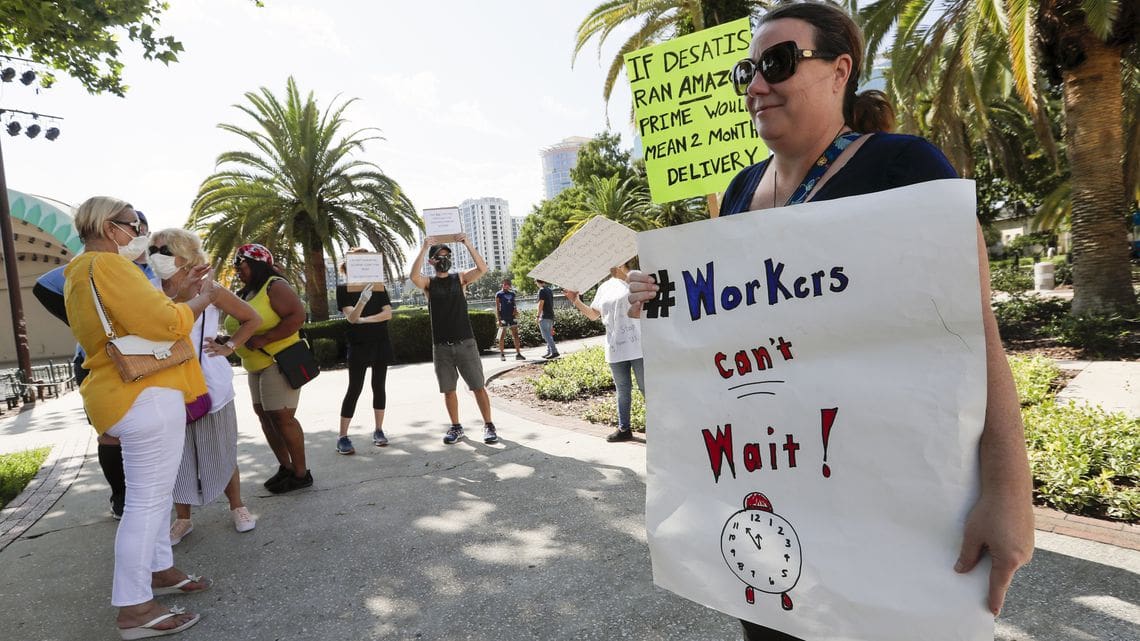Former call center workers said that stopping fraud was prioritized over providing benefits.
Opinion by the Tampa Bay Times Editorial Board
It’s no secret that Florida’s unemployment system performed disastrously during the height of the pandemic. But now it’s clear this fiasco was a combination of both incompetence and callousness. It reflects a mean-spirited approach under the guise of combating fraud, and it caused needless pain to struggling families and businesses.
A new report by reporter Lawrence Mower of the Times/Herald Tallahassee bureau chronicled how a state bureaucracy jerked around jobless Floridians by adding months of delays and frustrations for those waiting for benefits.
Pregnant women, Floridians sick with COVID-19 and those forced home to take care of children were denied benefits because they weren’t “able and available” for work under state law.
Former call center workers hired to help claimants told the Times/Herald that they were trained to nitpick applications. Jobless Floridians with simple discrepancies on their applications saw their claims locked, delaying payments by weeks or months. Couples who filed claims from the same computer were flagged for fraud. So were those from applicants whose information did not exactly match their driver’s license — such as those who failed to include a middle initial, or who listed an apartment number in the wrong format.
“If it was a Darryl Johnson Jr. and he put Darryl Johnson II on his application, we weren’t allowed to help them,” said Caitlin Polidoro, who worked at a call center from March until September. She was required to hang up if people offered inconsistent information — even those who had waited up to eight hours on hold to reach a claims representative. “They had only one chance,” Polidoro said.
The former call center workers said that stopping fraud was prioritized over providing benefits — a practice consistent with the state’s entire approach in operating a miserly benefits system.
While state officials blamed last year’s woes on the historic surge in unemployment claims, the state had for years championed its anti-fraud efforts. In 2014, it rolled out what it called a “state-of-the-art” software system, which cross-references data sets to identify suspicious patterns. In its first year, “fraudulent claims” shot up more than 600 percent, according to a 2016 agency presentation. The next year, the percentage of unemployed Floridians receiving jobless benefits fell three percentage points to just under 12 percent, the worst in the nation. (Florida has had the second-worst recipiency rate in the country since then.)
Florida has a legitimate interest in rooting fraud from the system. But fraud is being used as a harassment tool to keep legitimate beneficiaries from receiving the help they deserve.
An investigation by the state’s chief inspector general earlier this month attributed the 68 percent rejection rate in 2019 to, in part, the “normal functioning of the system’s fraud controls.”
And even jobless Floridians who overcome the hurdles of the state bureaucracy could wait weeks or months for much-needed assistance. This system doesn’t help those it’s supposed to serve or promote society’s larger interest in maintaining stable home environments.
Some legislators are calling for a re-evaluation of the strict anti-fraud measures promoted for years by Republican lawmakers and former Gov. Rick Scott. That’s long overdue. State Sen. Jason Pizzo, D-North Miami Beach, also wants a study of how the state’s unemployment website, known as CONNECT, denied benefits to Floridians. The Department of Economic Opportunity said it does not have data on specific reasons people weredenied unemployment. That information is key to measuring CONNECT’s performance and should be readily available.
There is more to maintaining integrity in the system than merely fighting fraud. The larger obligation is to process legitimate claims in a convenient and timely manner.
_____
This article represents the opinion of the Tampa Bay Times Editorial Board. The members of the Editorial Board are Editor of Editorials Graham Brink, Sherri Day, Sebastian Dortch, John Hill, Jim Verhulst and Chairman and CEO Paul Tash.
To see original article please visit: https://www.tampabay.com/opinion/2021/03/23/more-evidence-that-floridas-unemployment-system-was-designed-to-fail-editorial/





















